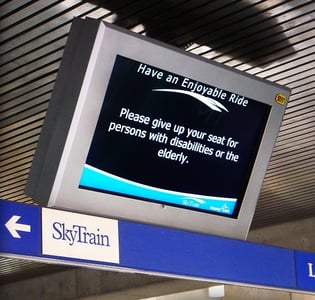Government work can be very lucrative for a business.
In our line of work, we receive requests from the digital signage industry (city improvement projects, transportation authorities) as well as the industrial sector (waste water treatment plants, military).
Based on the amount of information that is required on a 'Request for Quote' (RFQ), responding to government bids can quickly become overwhelming. Also, one might wonder if all the work is “worth it," because there is always the chance that the winning bidder has already been pre-determined during the specification process. Your company will greatly benefit from gaining a better understanding of the process – before you decide to devote time to the time-consuming quote.
Bid packages include page after page of blank spaces – all questions you - as the bidder - need to respond to in order to be considered a qualified bidder. Information such as product names, SKUs, data sheets, pricing, lead times, terms and conditions and the list goes on and on. In the article, 4 Tips for Bidding on Your First Government Contract, Peter Vanden Bos, states that government bids can be difficult to obtain, but the end result might be big, "The process of winning a federal contract can be painstaking, long, overwhelming, and certainly competitive, but the potential payoff can be huge."
So.... Where do you start?
4 Things You Need to Know For Responding to a Government RFQ

1. “No Bid”
There will be instances when you can provide the majority of the products and/or services, but a few items may be unavailable or not in your company's overall wheelhouse. Rather than leaving the space blank, be sure to include “No Bid” on the RFQ. If you fail to respond to one section, the entire bid can be quickly disregarded.
2. Failing to Respond
If you are receiving the bid package, you are considered to be a preferred supplier to the government entity that requested the information. If you fail to respond to the bid – your company could risk being taken off the circulation list for future opportunities with the city, college, or any other institution. As proper protocol, submit a “no-bid” letter to inform the institution that your company will be passing on quoting the opportunity.
3. Lowest Bidder
A general rule of thumb – government institutions require a minimum of three competitive bids to be submitted for a RFQ. This encourages bidders to be as competitive as possible with pricing, terms and other services associated with the project. However, the owner is not obligated to award the lowest bidder with the contract. The bidding company must be determined as responsive and qualified. Bids must be received on time and completed in full.
4. Respond Precisely
In a competitive environment, do not make the mistake of over-proposing the bid. Avoid adding features and benefits that are not required in the specifications. This will cost more money, thus pricing you away from the competition. Respond precisely regarding price – do not attempt to win a bid where the products and/or services are priced too low. Based on the price you quote, be prepared to be held accountable to deliver.
The institution has a great deal of leeway in determining if the vendor is qualified to win the bid. Do not give them a reason why you do not meet the minimum requirements. If given the opportunity, work with the government institution on developing the bid specifications. This will help streamline the process, provide credibility, and, in turn, help you earn more business.
For More Information:
-- 4 Things to Know Before Bidding Digital Signage Projects
-- 6 Factors that Affect the Cost of Outdoor Digital Signage
HAVE QUESTIONS? LET US KNOW HOW WE CAN BEST ASSIST YOU! CONTACT AN 'ITSENCLOSURES EXPERT' AT 1-800-423-9911 -OR- SEND US AN EMAIL: INFO@ITSENCLOSURES.COM



